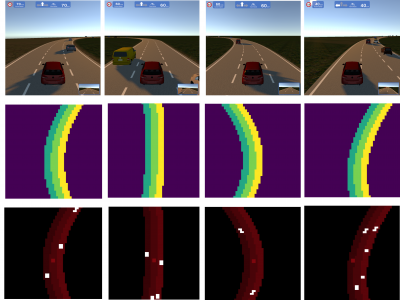Machine Learning
Volkswagen Group of America Innovation and Engineering Center California (VW IECC) is a research facility in Belmont, California working on the future of the mobility. In the recent years exciting developments have happened for the autonomous vehicles. In general, lack of data is the main problem to tackle to solve the task of autonomous driving. One of the important tasks in this topic is the overtaking and lane changes, especially in the highway scenarios.
- Categories:
 508 Views
508 ViewsIn the contemporary cybersecurity landscape, robust attack detection mechanisms are important for organizations. However, the current state of research in Software-Defined Networking (SDN) suffers from a notable lack of recent SDN-OpenFlow-based datasets. Here we introduce a novel dataset for intrusion detection in Software-Defined Networking named SDNFlow. The dataset, derived from OpenFlow statistics gathered from real traffic, integrates a comprehensive range of network activities.
- Categories:
 1976 Views
1976 Views
Accurate knowledge of key genes that promote hair follicle growth and development is of great value in the field of hair research and dermatology. Compared with the traditional time-consuming and laborious experimental methods for obtaining key genes, the literature mining method can extract proven key genes for hair follicle growth from the vast amount of literature more quickly and comprehensively, i.e., perform the tasks of Named Entity Recognition (NER) and Relationship Extraction (RE) of related entities.
- Categories:
 107 Views
107 Views
The prognostic survival dataset, Pancreatic Cancer Survival based on Preoperative Features (PCSPF), was constructed to explore the impact of key preoperative features on prognosis based on the follow-up data of patients with pancreatic cancer at Changhai Hospital, Shanghai, China.
- Categories:
 824 Views
824 Views
# Datasets for stage 3
The datasets were collected from a software-based simulation environment simulating a small-scale IEC 61850-compliant substation with both the primary plant and the process bus.
The datasets consist of 148 attack scenarios, each scenario includes two benign behaviours (fault-free behaviours and emergency behaviours) and one type of malicious behaviour.
- Categories:
 194 Views
194 Views
Accurate prediction of protein-ligand binding affinities (PLAs) is essential for drug discovery, repositioning, and design.
- Categories:
 47 Views
47 Views
Captcha stands for Completely Automated Public Turing Tests to Distinguish Between Humans and Computers. This test cannot be successfully completed by current computer systems; only humans can. It is applied in several contexts for machine and human identification. The most common kind found on websites are text-based CAPTCHAs.A CAPTCHA is made up of a series of alphabets or numbers that are linked together in a certain order.
- Categories:
 524 Views
524 Views
In medical applications, machine learning often grapples with limited training data. Classical self-supervised deep learning techniques have been helpful in this domain, but these algorithms have yet to achieve the required accuracy for medical use. Recently quantum algorithms show promise in handling complex patterns with small datasets. To address this challenge, this study presents a novel solution that combines self-supervised learning with Variational Quantum Classifiers (VQC) and utilizes Principal Component Analysis (PCA) as the dimensionality reduction technique.
- Categories:
 131 Views
131 Views
The dataset encompasses an extensive collection of patient information, delving into their comprehensive medical background, encompassing a myriad of features that encapsulate not only the physical but also the mental and emotional states. Furthermore, the dataset is enriched with invaluable ECG data derived from the patients. Moreover, our dataset boasts additional features meticulously extracted from the ECG records, thereby enhancing the potential for our machine learning model to undergo more effective training with our rich and diverse data.
- Categories:
 678 Views
678 ViewsThe choice of the dataset is the key for OCR systems. Unfortunately, there are very few works on Telugu character datasets. The work by Pramod et al has 500 words and an average of 50 images with 50 fonts in four styles for training data each image of size 48x48 per category. They used the most frequently occurring words in Telugu but were unable to cover all the words in Telugu. Later works were based on character level. The dataset by Hastie has 460 classes and 160 samples per class which is made up of 500 images.
- Categories:
 964 Views
964 Views

